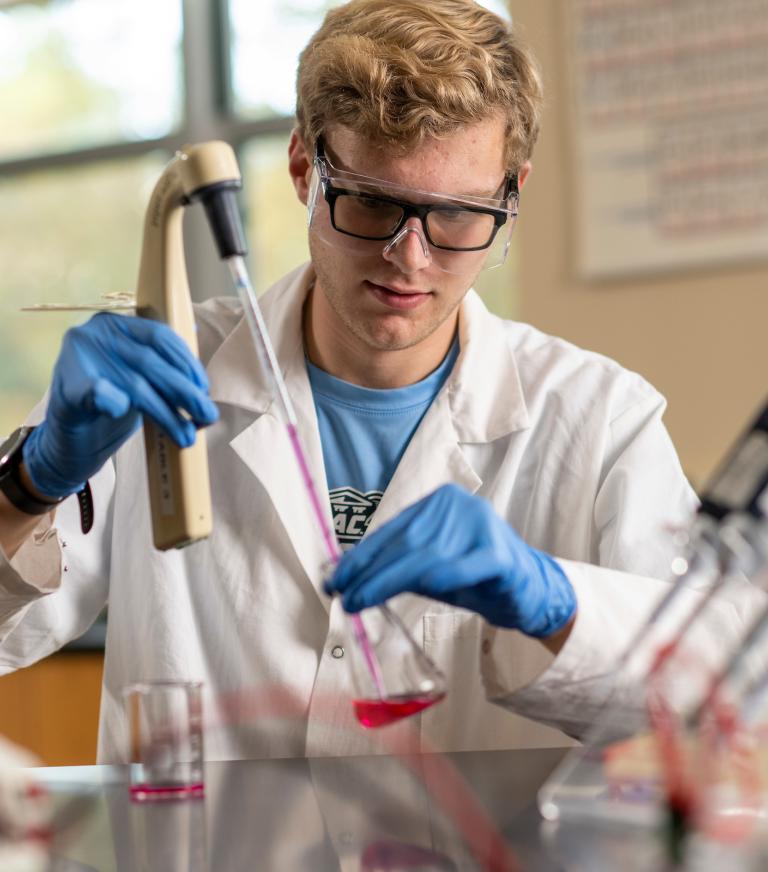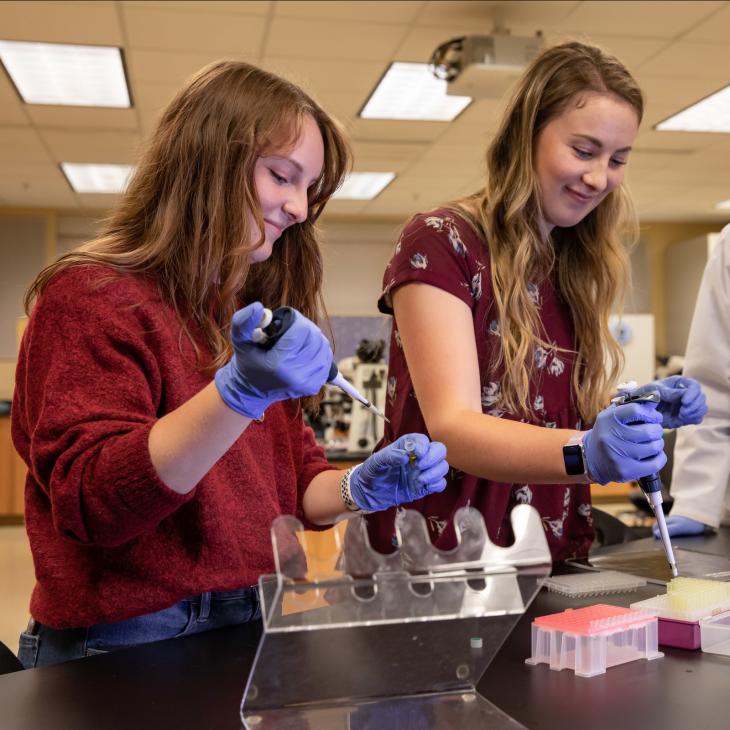Biology

Program Type
B.S.
Est. Time to Complete
4 Years
School
Kinsley School of Engineering, Sciences and Technology
Delivery Mode
On Campus

Make your own discoveries in a hands-on Biology major program.
The Bachelor of Science (B.S.) in Biology degree program at York College of Pennsylvania opens up career possibilities in a wide range of industries: laboratory research, healthcare, environmental conservation, and more.
As a Biology major, faculty experts guide you in research projects from day one, whether you know what branch of biology interests you or need some time to explore. Use the latest laboratory facilities to view and understand cells as building blocks, explore different habitats, or take health and medicine courses through WellSpan York Hospital.
Go beyond textbooks to build a strong foundation, specialize in a concentration area, and gain first-hand experience in the lab and the field according to what interests you.
About the Bachelor of Science in Biology
Biology Major Requirements
Students in the Biology degree program build a broad foundation in biological sciences through a series of major-specific and elective courses. An optional concentration area pathway allows students to investigate a specific area of the field more deeply.
Requirements for the Bachelor of Science in Biology include:
- Core Major Courses
- Research Series: BIO 392 Biology Inquiry I and BIO 393 Biology Inquiry II
- Concentration Courses or Biology Electives
- General Electives
Study areas include environmental science and ecology, genetics, anatomy and physiology, and organic chemistry and biochemistry. Research and inquiry are integral to the Biology major, and laboratory and research opportunities begin in the first few courses students take.
Concentration Areas
Biology majors either continue pursuing the general study plan or specialize in one of the following concentrations:
- Biotechnology: Hands-on experience applying studies to biomedical and health-based industries.
- Cell and Molecular Biology: In-depth examinations of how genetic information impacts organisms.
- Ecology and Conservation: Immersions in ecological challenges through data collection and analysis.
- Pre-Professional Medicine: Prepare for medical and professional program entrance examinations with faculty guidance.
Admissions and Aid
Emerge from your Biology degree program ready and confident to take on the challenges of STEM careers and rigorous graduate study. To take the first step, we are here to assist you in completing the seamless, rolling-deadline undergraduate admissions process.
Learn about costs and financial aid at York College to understand tuition and reach out with any questions.
Earn a B.S. in Biology at York College of Pennsylvania
If you’re curious about the world around you and just reading about it isn’t enough, York College’s bachelor’s in Biology program empowers you to make real discoveries in each course you take.
Get started with a request for information. Or begin an online application.
Career Preparation
The tailored coursework, research, and internship opportunities in the bachelor’s in Biology program open many possibilities for future careers. Biology majors can pursue roles in health and medicine, biotechnology, writing and journalism, microbiology, ecology, or environmental science or opt for graduate school in biomedical fields, public health, physical therapy, optometry, dentistry, or veterinary medicine. Popular pathways include:
- Working in the pharmaceutical and biotechnology industry labs
- Research at educational institutions or research institutes
- Measuring and analyzing chemical and biological data for quality assurance or ecological health
- Environmental education and community outreach
- Natural resource management
The analytical, laboratory, and critical thinking and communication skills practiced throughout the program ensure graduates can contribute to the scientific field as laboratory technicians and research assistants, with the groundwork for taking on further responsibilities and more complex research throughout their careers.
Salary and Outlook
The field of biology offers competitive entry-level salaries and a variety of workplaces and industries from which to choose. The Bureau of Labor Statistics (BLS) also projects that scientific occupations will grow faster than other occupations on average through 2032.
With a bachelor’s degree in Biology, students can expect to pursue roles with average annual salaries that look like the following from the BLS:
- Biological technicians—$52,000/year
- Forensic science technicians—$67,440/year
- Agricultural and food science technicians—$78,770/year
- Environmental scientists and specialists—$80,060/year
- Microbiologists—$87,330/year
While wages vary depending on the location and exact job description, the BLS reports biological scientists earn the most in scientific research, federal and local government settings, and colleges and universities.
Undergraduate Research
Each Biology major at York College completes a two-semester research course and has consistent opportunities to complete in-class projects, where they can ask novel questions and advance knowledge in cutting-edge areas. Many students also complete independent research alongside faculty mentors.
Past student research projects have focused on:
- The CRISPR-Cas9 system for gene editing cancer treatments
- Disease prevalence in amphibian and reptile populations
- Migratory patterns of owls
- Molecular mechanisms of retinal development
- Viral entry into host cells
Students in the Biology degree program have studied the stream that runs through campus, worked in conservation in York County Parks, performed clinical research with WellSpan Health, and even presented research findings at international conferences such as the National Diversity in STEM Conference in Puerto Rico.
Internships and Assistantships
Our Biology major program stands out for how our students regularly participate in optional summer internships and paid, unpaid, and credit-bearing work experiences. After your first Biology course, paid lab assistant jobs open up under expert York College faculty, and our unique study abroad programs include ecology internships in Greece and taking classes at Universidad Veritas in San Jose, Costa Rica.
Summer internships also include working with local organizations like West Shore Wildlife Center and Eurofins Lancaster Laboratories.
Professional Laboratory Facilities
As a Biology student, you’ll have access to the same equipment used in professional research laboratories. Facilities include a state-of-the-art tissue culture suite, a large aquaria space, and modern labs. This ensures your work is authentic and meaningful as you carry out explorations based on a question — not just cookie-cutter lab projects — in preparation for research and lab management careers.
Career Support and Mentorship
Students in the B.S. in Biology degree program appreciate the time and effort the professors put into getting to know each individual’s career goals. Personal advising ensures coursework supports diverse aspirations and satisfies expansive curiosities. York College’s Biology majors who are interested in pursuing medical school or other careers related to the field of medicine, such as physical therapy, dentistry, veterinary care, or optometry, can follow a well-rounded pathway of coursework and clinical experiences before taking exams or applying for a professional or graduate degree program.
Academic and Extracurricular Clubs and Organizations
York College has a wide variety student clubs and organizations of various interests, sizes, and purposes. Organizations range from academic honor societies to Greek living, from drama to publishing, from exploring cultures to joining student government.
- Biology Club
- Pre-Medical and Allied Health Society
- Tri-Beta (Beta Beta Beta) National Biological Honor Society
- Women in Science and Engineering (WISE)
Skill Outcomes
The valuable skills learned in the B.S. in Biology degree program encompass careers ranging from environmental science to health and medicine, whether students immediately enter laboratory roles or pursue further education for high-level research careers and medical practice. Graduates demonstrate:
- Proficiency in laboratory and field techniques, including PCR, cell culture, and bioinformatics
- Experimental design and data collection
- Data analysis and interpretation
- Problem-solving and troubleshooting in a research setting
- Teamwork and collaboration
- Effective written communication and presentation
- Deeper understanding of ecology and conservation biology across career applications
- Ethics in the laboratory and in STEM research
- Safe use of up-to-date laboratory equipment
Biology Minor and Related Programs
York College offers a variety of options for students interested in STEM. For example, you can pursue a Biology minor alongside a different bachelor’s program to acquire valuable experience related to the biological sciences. Alternatively, consider seeking a double major or another minor to complement your studies as a Biology major:
- Chemistry
- Neuroscience
- Professional Writing
- Psychology
Biology Courses
Gain insight into broad and in-depth scientific knowledge through courses that encourage exploration and include hands-on lab experiences.
| Course Name | Course Code | Credits |
|---|---|---|
| Molecules, Genes and Cells | BIO 142 | 4 Credits |
| Genetics | BIO 240 | 4 Credits |
| Biochemistry | BIO 350 | 4 Credits |
| Neurobiology | BIO 360 | 4 Credits |
Careers in Biology
The skills you develop as a Biology major open doors to further education and many career options across scientific and technical industries, including:
Research Scientist
Microbiologist
Natural Resource Manager
Pharmaceutical Sales and Marketing
Field Biologist
Biotechnologist

Build your dream career, one day at a time.
This is day one. From your first semester on campus through graduation day, York College offers expert advice, professional development opportunities, and personalized support to help you navigate the choices that influence your future.
Explore resources for a successful college experience:
Frequently Asked Questions
Yes, a biology degree is a common undergraduate major for aspiring medical students. It provides a strong foundation in the essential sciences and helps develop critical thinking, problem-solving, and analytical skills, all vital for medical practice. Biology programs often include courses in human biology, anatomy, physiology, genetics, and biochemistry, and many offer a pre-med track wi
Biology majors apply their skills in practical and impactful ways in scientific, medical, and commercial settings. Graduates can pursue entry-level positions such as lab technician, quality control analyst, or research assistant in settings including pharmaceutical companies, research institutions, universities, and government agencies, where they conduct experiments and support research projects. This degree also provides a solid foundation for graduate studies in specialized fields, from medicine to molecular biology or public health.
If you are interested in the molecular and chemical makeup of the natural world and are ready to take more advanced chemistry courses, biochemistry degree programs can help you develop skills for a career in the chemical aspects of science. On the other hand, biology programs provide a broader understanding of biological organisms and processes, covering areas such as chemistry,
Meet the Faculty
View All FacultyBiology in Action
View All NewsRelated Programs
Premedical Sciences
York College of Pennsylvania’s Bachelor of Science (BS) in Premedical Sciences degree program prepares students academically and holistically for competitive pre-professional programs in medicine. If you aspire to pursue a career in medicine, this premed major program offers a comprehensive education in the essential sciences and the foundation necessary for the rigors of medical school, dental school, PA school, pharmacy school, and more.
Environmental and Sustainability Studies
York College of Pennsylvania’s innovative Bachelor of Arts (BA) in Environmental and Sustainability Studies degree program bridges the gap between a high-impact scientific background and an examination of the change-making, human-based policies and processes that bring the science of sustainability to life. Whether you are driven to a career path in local organic farming, regional waterways, or tackling national legislation, the Environmental and Sustainability studies degree ensures you’ll be able to expertly study an ecosystem and inspire others to protect it.
Environmental Horticulture
The Appell Environmental Horticulture Program at York College of Pennsylvania immerses students in the science and the business of growing and using plants while responsibly caring for the world’s soil, air, and water resources. As an Environmental Horticulture major, you’ll complete hands-on learning opportunities in the classroom, greenhouse, and laboratory. You won’t just learn how to maximize crop yields; you’ll become equipped to contribute to global change through real-world research projects and a 50-acre horticultural learning lab.
Environmental Science
Earning a degree in Environmental Science from York College, you’ll develop a fundamental understanding of all the basic sciences: biology, ecology, chemistry, and physics. With a stream running through campus; local access to lakes, wetlands, fields, and forests; and state-of-the-art equipment in the Naylor Ecological Sciences Center, you’ll get hands-on experience with projects in both the lab and the real world.
Medical Laboratory Science
From collecting data to analyzing laboratory results, students in York College’s Medical Laboratory Science program are gaining the skills they need to make an impact in the world of medicine. Whether you see yourself developing new medications for the pharmaceutical industry, conducting medical research in a hospital lab, or finding new ways to bring comfort to animals through veterinary studies – York College can give you the tools to get there.
Biochemistry
York College of Pennsylvania’s BS in Biochemistry degree program is a gateway to a multitude of post-graduate opportunities in biomedical science, healthcare, academics, industry, and public health. Through a student-centered approach to learning, Biochemistry majors at York College prepare to enter the field as trained chemists or pursue further education backed by internships and research experience.








